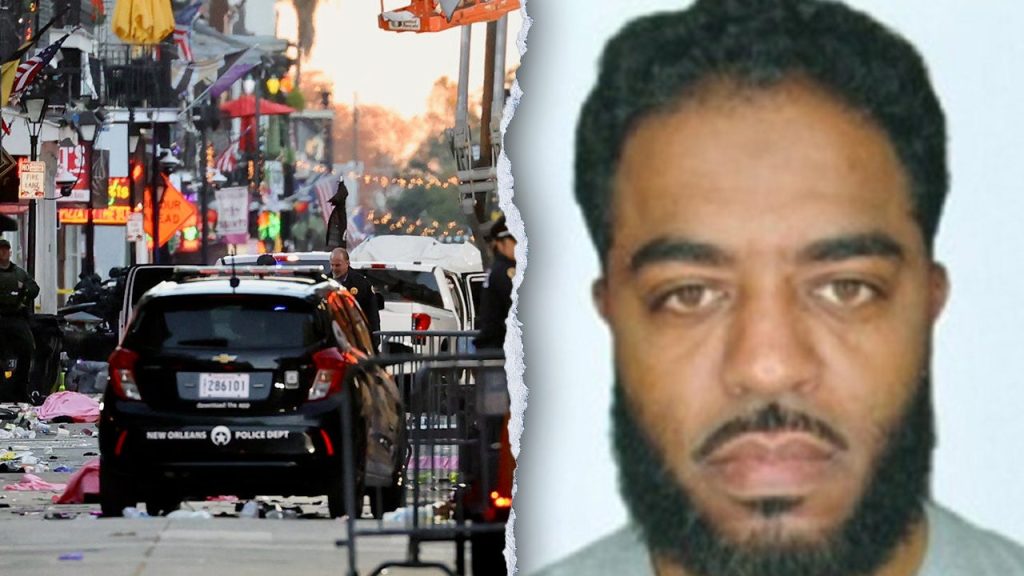The horrific truck attack that transpired on Bourbon Street in New Orleans on Wednesday, claiming the lives of at least 15 people and injuring dozens more, is now the epicenter of a multi-state investigation led by the FBI. The perpetrator, Shamsud-Din Jabbar, was killed in a shootout with police following the attack, but authorities are actively pursuing leads on potential accomplices who may have aided in orchestrating the carnage. Louisiana Attorney General Liz Murrill has confirmed the existence of evidence pointing towards collaborative efforts in the attack, although specifics remain undisclosed as the investigation unfolds. The FBI, echoing the Attorney General’s suspicion, has stated that they do not believe Jabbar acted alone and are executing search warrants in multiple states, including Jabbar’s primary residence in Houston, Texas, and an Airbnb in New Orleans believed to be connected to him.
Inside Jabbar’s truck, investigators uncovered a cache of weapons, including firearms and what appeared to be an improvised explosive device. Additional devices were also discovered elsewhere in the French Quarter, raising concerns about the planned scale and potential devastation of the attack. The discovery of these devices underscores the gravity of the situation and the meticulous work being undertaken by the FBI’s Evidence Response Team to process the crime scene and gather all pertinent evidence. This meticulous approach is crucial not only for understanding the full extent of Jabbar’s plot but also for identifying any potential network of support that facilitated his actions. The multi-state nature of the investigation highlights the complexity of the case and the potential reach of the conspiracy.
Jabbar, a U.S. native born in Texas, had a history of military service, having served in both the Army and Army Reserves as a Human Resource Specialist and Information Technology Specialist. He also deployed to Afghanistan for a year. This background raises crucial questions about his radicalization and the potential motivations behind his deadly act. Authorities are currently working to piece together a timeline of Jabbar’s radicalization and determine when and how he came to embrace extremist ideologies. Prior to the attack, Jabbar posted videos on social media professing allegiance to the Islamic State, a development that adds another layer of complexity to an already intricate investigation. The FBI is likely scrutinizing these online activities to glean insights into Jabbar’s mindset, his connections, and any potential communication with other extremist groups or individuals.
The attack has sent shockwaves through the nation and prompted strong reactions from various quarters. The Sugar Bowl, a major sporting event scheduled for Wednesday night, was postponed to Thursday and faces potential further delays as the city grapples with the aftermath of the tragedy. The attack has also ignited a political firestorm, with President-elect Trump criticizing the current administration’s handling of national security and calling for the CIA’s involvement in the investigation. He condemned Jabbar as “violent scum” and attributed the attack to what he perceives as weak leadership and open borders. He further criticized the Department of Justice, FBI, and Democrat state and local prosecutors for what he described as incompetence and corruption, claiming their focus had been misdirected towards attacking him rather than protecting Americans.
Trump’s remarks came on the heels of a separate incident involving a Tesla Cybertruck explosion outside Trump Hotel in Las Vegas, which claimed one life. Whether this incident is connected to the New Orleans attack remains to be determined, adding another layer of uncertainty and concern to an already tense situation. The timing of these events fuels speculation and underscores the need for a swift and thorough investigation to ascertain if there are any linkages between the two incidents. The potential for coordinated attacks raises serious national security concerns and necessitates a comprehensive review of existing security protocols.
The attack in New Orleans serves as a stark reminder of the persistent threat of domestic terrorism and the challenges faced by law enforcement agencies in combating this evolving threat. The investigation, encompassing multiple states and delving into the complexities of Jabbar’s radicalization, will undoubtedly be a long and arduous process. As authorities work tirelessly to uncover the full truth behind this horrific act, the nation mourns the victims and grapples with the implications of this senseless violence. The focus remains on bringing all those responsible to justice and ensuring the safety and security of communities across the country. The incident underscores the critical importance of vigilance, preparedness, and cooperation between law enforcement agencies at all levels.


